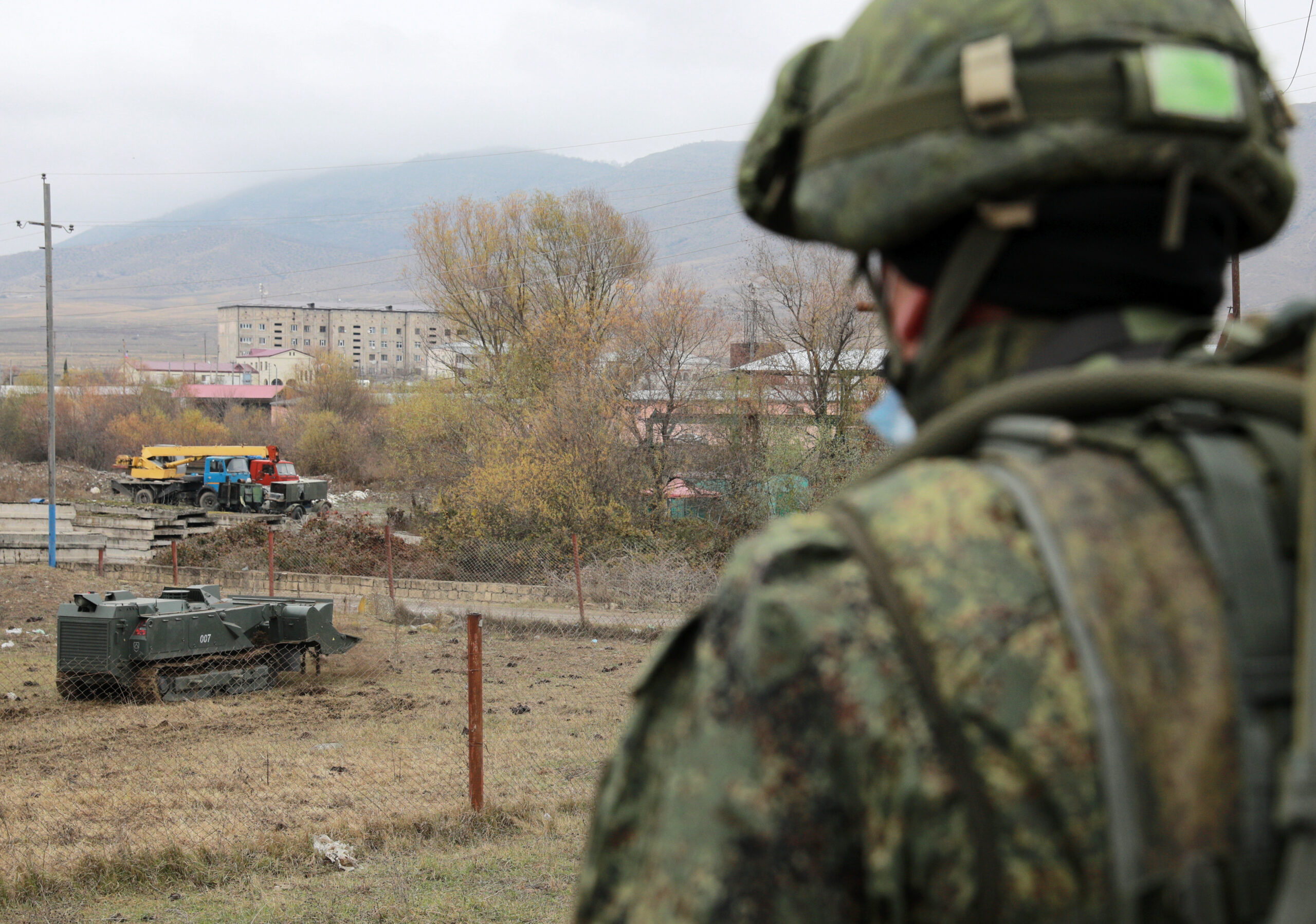At dawn on September 13 Azerbaijan launched an offensive along the eastern border of Armenia — not Karabakh, as widely mistakenly reported across international media outlets. The fighting was the largest in the entire history of the conflict between these two countries and unprecedented on the internationally recognized borders of Armenia. Cities of Jermuk, Goris, Kapan, Vardenis, Martuni, Sisian and more than a dozen villages came under heavy artillery fire and UAV strikes, causing 207 confirmed deaths from the Armenian and 79 from the Azerbaijani side; many more civilians were heavily injured and at least 2750 displaced. On top of that, hundreds of houses and countless parts of civilian infrastructure have been destroyed — all on Armenian territory.
As a result of the attack, Azerbaijan, among other things, destroyed a number of strategic military targets; these include air defense systems, which are part of the Russian-Armenian joint air defense system established in 2016. As a result of the attack, Azerbaijan occupies a total of over 50 sq kilometers of Armenian territory and oversees strategic communication lines connecting to the southern part of the country, as well as Karabakh and Iran. Before the 2020 Karabakh war, Russia was able to prevent or shortly restrain such acts of aggression in the South Caucasus. That ability, with its own troops stretched to their limit in Ukraine, has now come into question.
Structure and Agency
Since the First Karabakh war and the fall of the Soviet Union, Russia has played the role of the main regional hegemon, mediator, and manager of the conflict between Armenia and Azerbaijan. That role has even been accepted by the West as France and the US — the Minsk group Co-Chairs — for a long period but especially in 2010s regarded it the primus inter pares «firefighter» of the conflict.
In 2020, Russia’s regional monopoly was compromised by Turkey as it took an active part in the Karabakh war. Turkey not only provided intelligence, commanders, technical and command assistance; it also pressed Vladimir Putin into favourable ceasefire terms. Part of that deal saw Putin accept a Turkish military presence in Azerbaijan — previously, a non-starter for Russian policy anywhere in its near abroad. Since then, South Caucasus affairs have become a usual serving in the long menu of topics on the agenda of the two leaders. That implies a recognised power sharing unseen in the post-Soviet space.
There are forced (structural) and voluntary (agency-based) reasons in Kremlin’s change of behavior which explain its stance during the September 13−14 attacks. Structurally, Turkey’s military might and ambitions had outgrown the status it had in the South Caucasus. While largely present economically and in limited military ways, it had not enjoyed the same status as a security broker and provider as Russia. The security window Azerbaijan opened for Ankara in the Second Karabakh war upgraded its status and shattered the pivotal deterrence to Russia. Gone are the days where Russia on its own can leverage deference to manage the conflict and keep the sides in balance. In the backdrop of the current Russia-West meltdown, Russia has little other choice; and as far Putin is concerned, Erdogan is «a man of his word».
However, to deter any Turkish and Azerbaijani threats, Armenia has long relied on its Russian alliance; alternative security guarantees do not exist for Armenia. While this alliance has characterized the region’s security architecture, Azerbaijan’s attractiveness in Moscow’s eyes has steadily grown in the last two decades. Increasingly, Baku is considered a valuable energy, communication, and military-technical partner (that is, a lucrative business client). Taking Armenia’s loyalty for granted, Moscow has been worried about Baku’s slide away from its orbit, and toward the West and Turkey.
Baku’s agency played a key role in playing up these concerns. Understanding the Kremlin’s position for resolution within the Karabakh conflict and realizing the risks of flirting with the West, especially so after the 2008 Russian-Georgian war, the Azeri strongman Ilham Aliyev followed a policy of moderately appeasing Moscow. Meanwhile, the EU’s traditional but especially current energy needs give Aliyev profitable leverage over Brussels as Ursula von der Layen considers him a «reliable, trustworthy partner». On the other hand, Armenia itself has gone on to balance Russian hegemony with the EU — highly unpleasant for the Kremlin and ultimately leading to Armenia’s forced entrance into the Russia-led Eurasian Economic Union. If that was not enough, Armenians delivered regime change through a revolution — a traditional irritant for the Kremlin for well-known reasons.
An Unchecked Winner Wants to Take More
This security architecture defines relations between Moscow, Baku and Yerevan, including the recent attack. By enjoying its unpunished gains through military power, Baku is more than willing to exercise force again to capitalize on Armenia’s weaknesses and further degrade its military abilities. Since the 2020 ceasefire, those demands that Azerbaijan was not able to achieve diplomatically were shortly achieved through coercive bargaining — that is, more aggression. And it is working. Azerbaijan not only demands complete control of Karabakh (all areas that passed under their control have been completely ethnically cleansed); it also calls for also provision of sovereign exterritorial corridors to its exclave Nakhichevan through Armenia’s territory (in fact, a direct land connection with Turkey); it is claiming authority over artificially created Soviet enclaves, as well as claims over the entire South of Armenia and even of heritage over Yerevan. Armenia seems to have agreed to a lowering of the bar of for its demands on the Karabakh issue; but it announced that Armenia’s sovereign territory remains outside of the bargain. Besides, while Armenia wants a simple opening of communications and Azerbaijan full control over «corridors», Russia doesn’t satisfy any, since its goal is to open roads and have the FSB overseeing them according to the trilateral ceasefire agreement.
Until now unable and unwilling to confront Azerbaijan, the authorities in Yerevan are deploying appeasement and delay tactics toward Baku, in the hope to satisfy Azerbaijan’s appetite and maybe postpone its full-scale offensive to a date when Armenia’s military will be able to resist.
Russia has hoped that appeasing Azerbaijan and Turkey — at the cost of its relations with Armenia — would diplomatically compensate for the military-security disbalance since the 2020 Karabakh war. Aiming to keep Azerbaijan close or even integrate Baku into its Eurasian projects as a strategic goal and submitting to Azerbaijan’s demands enough to be able to keep Russian peacekeepers on ground as a more immediate goal, Russia only increased Baku and Ankara’s leverage. Russia’s appeasement of the latter two is a strategic blunder based on false expectations; Armenia’s appeasement is a result of its military diplomatic inability to act otherwise: both policies have passed security control of the region over to Erdogan and Aliyev.
Against other speculations, I argue that Russia is realizing the consequences of its blunder and is increasingly unable to deter aggression in South Caucasus. Although Russia is seeking to rectify this mistake, it has given a regional upper hand to the «one nation, two states» declared by Aliyev and Erdogan while spending too long not prioritizing the Caucasus in its foreign policy agenda. Looking forward, especially in parallel to being immersed in Ukraine, gears of control are slipping away from Russia. In what looks ever more like overstretch, Russia still wants to be the mediator in charge, simultaneously maintaining Azerbaijan’s waning loyalty, while keeping its status vis-à-vis Armenia
In trying to manage the conflict on its own beneficial terms, while doing too little too late, Moscow attempts to sit on multiple chairs at once.
Before It’s Too Late
There is no doubt that in the Kremlin they see Azerbaijan as the aggressor. Still, Moscow avoids taking a public stance to match, fearing an authority loss over Baku, which has been repeating that the deployment of Russian peacekeepers in Karabakh is temporary.
On the other hand, Russia is slowly — albeit very — coming to an understanding which it doesn’t want to show publicly. Namely, that this language of temporary peacekeepers damages its position in Armenia. Like Russia, Armenia is very interested in maintaining Russian troops in Karabakh as they politically shield the 120.000 Armenians living there. Vladimir Putin has stated — according to the bilateral defense treaty — that Russia will fulfill its bilateral and CSTO obligations; but most of the fighting in 2020 was in Karabakh. After the war, Armenia has appealed to the CSTO multiple times during recurring Azerbaijani aggressions with little substantive response. In January 2022, Nikol Pashinyan, the-then chairman of CSTO Council, led the process of deploying peacekeepers to Kazakhstan during domestic turmoil: he hoped the organization and Kazakhstan too — a long-time Azerbaijani ally — would return the favor. When Yerevan applied again on September 13, the CSTO’s reply was to send a mission to assess the situation. Clearly that didn’t meet Yerevan’s expectations. However, realizing its reputation cannot afford more inaction, the CSTO responded «better» than before. Moscow again applied maximum diplomatic efforts to stopthe fighting, announced how a ceasefire came via its mediation, (though the fights only severed) and kept a diplomatic equidistance; France, the US and even India were pointing to Azerbaijani aggression and winning the hearts of at least ordinary Armenians.
Russia is certainly not enjoying this predicament; cooperation, even in secrecy, with Western partners might help. Now it feels like an odd memory, but the Minsk Group has been one of the only platforms where US, France and Russia cooperated in earnest. A new lease of life there might help it to stabilize the region, share the costs of conflict management, balance Turkey back and restore a transformed regional leadership. But as the Russian failure in areas like Kharkiv is one of the permissive factors for Azerbaijan, this sort of cooperation could also be necessary to avoid any more bloody unfreezing of other post-Soviet conflicts.
Overall, Moscow’s actions are indicative of its willingness but inability to singlehandedly manage the conflict and restrain Azerbaijan without giving it a cold shoulder. Similar to crisis management styles in domestic affairs, Russia tries to conceal the scale of the problem, downgrading it to avoid being forced to respond and bare reputational costs. However, this method fails to manage the conflict, encourages the aggressor, and distances Armenia. After its defeat in the 2020 war, surveys show the Armenians already were feeling their expectations of their ally had not been met and Russia no longer lived up to an image of a main protector. So Russia has to act more resolutely, or this reputation will fade even more. For Russia, it is a strategic make-or-break moment in the South Caucasus; it can’t afford to simply deal with it after its Ukraine war is done, whenever that might be.









